|
|
|
Sort Order |
|
|
|
Items / Page
|
|
|
|
|
|
|
| Srl | Item |
| 1 |
ID:
190411
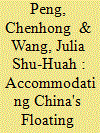

|
|
|
|
|
| Summary/Abstract |
What are the various ways in which local governments in China accommodate migrants through housing policies, and what are the forces that drive these variations? Through systematic coding of policy documents from 97 prefecture-level cities, this study captures the patterns of migrant housing policies using cluster analysis. We found that 18.6 per cent of the cities adopted a residual approach. Most cities adopted a rental-based approach (public and private rental, and collective rental) that could only meet migrants’ short-term housing needs. Only a few cities (12.4 per cent) adopted a citizenship-oriented approach, which best fits the central government's overarching goal of facilitating migrant workers’ long-term settlement in the host cities. Regression analyses examining the determinants of local migrant housing policies showed that the policy variations were not only shaped by economic and political concerns but also the salience of urban issues (problem-solving functions) and previous welfare generosity (path-dependency tendencies).
|
|
|
|
|
|
|
|
|
|
|
|
|
|
|
|
| 2 |
ID:
087033
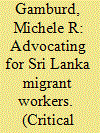

|
|
|
|
|
| Publication |
2009.
|
| Summary/Abstract |
Nearly a million Sri Lankan women labor overseas as migrant workers, the vast majority in the Gulf Cooperation Council (GCC) countries in West Asia. They are poorly paid and vulnerable to a wide variety of exploitative labor practices at home and abroad. Despite the importance of worker remittances to Sri Lanka's national economy, and in spite of the nation's history of organized labor and active political participation, migrants have received only anemic support from the state, labor unions, feminist organizations, and migrant-oriented nongovernmental organizations. The article contextualizes Sri Lankan migration within larger-scale economic dynamics (such as global capitalist policies and processes) and local-level ideological formations (such as local political histories and culturally shaped gender norms). The author argues that political freedoms in destination countries have a significant effect on organizing activities in both host and sending nations. Comparing the Sri Lankan and Philippine situations, the author contends that the vibrant activism in the Philippines correlates with the liberal organizing climates in the European Union and in East and Southeast Asia, while the paucity of organizing in Sri Lanka correlates with the strict repression of guest workers in the GCC. Compared to other destinations, the GCC countries give workers (particularly women) less chance for autonomous activities, are less open to labor organizing, and are less responsive to political protest.
|
|
|
|
|
|
|
|
|
|
|
|
|
|
|
|
| 3 |
ID:
119050
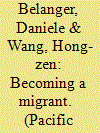

|
|
|
|
|
| Publication |
2013.
|
| Summary/Abstract |
Since the early 1990s several million men and women from Southeast Asia's lower socioeconomic classes have migrated to East Asia with a temporary worker visa or a spousal visa. This article is based on five years of ongoing fieldwork in migrants' communities of origin in rural Vietnam and in places of destination in Taiwan, South Korea and Japan. The authors make three contributions: first, they argue that the categorization of migrants as either "workers" or "wives" in research obscures the complex trajectories and motives involved in the process of "becoming a migrant." Second, they challenge studies that unquestioningly invoke social network approaches to migration. Instead, social networks should be regarded as a double-edged sword for emigrants because personal networks are embedded in a powerful migration industry. Third, they contend that migration outcomes and levels of success are, in part, influenced by processes taking place before departure. This article sheds light on the tension between migrants' agency and the structural constraints faced by candidates seeking to migrate from Vietnam, and from Southeast Asia more broadly.
|
|
|
|
|
|
|
|
|
|
|
|
|
|
|
|
| 4 |
ID:
171038
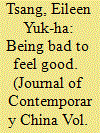

|
|
|
|
|
| Summary/Abstract |
The plight of male migrant workers in China warrants critical attention because their diminished opportunity for life success has created a public health issue. To cope with hopelessness and despair they engage in risky behaviors involving paid sex and drugs. This article extends Connell ’s notion of hegemonic masculinity, linking urban migration with a rampant ‘masculinity crisis’ engulfing these single migrant men. Interviews with 100 male migrants who admitted to regularly buying commercial sex in low-end and mid-tier bars revealed underlying cultural tensions which drive them to use paid sex and drugs to help them cope with their emasculated reality. This article facilitates understanding of China’s masculinity crisis against the backdrop of the nation’s post-socialist transition in a wider social, cultural, and historical structure.
|
|
|
|
|
|
|
|
|
|
|
|
|
|
|
|
| 5 |
ID:
131958
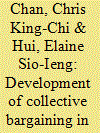

|
|
|
|
|
| Publication |
2014.
|
| Summary/Abstract |
2010 was a turbulent year for labour relations in China. The wave of strikes sparked by the Honda workers has highlighted the urgent need for trade union reform and workplace collective bargaining. In response to this turbulence, the Chinese government has stepped up efforts to promote the practice of collective bargaining, which had been neglected under the existing "individual rights-based" labour regulatory framework. In the midst of rapid social and policy changes, this article aims to examine the effect of labour strikes on the development of collective bargaining in China. The authors argue that, driven by growing labour protests, the collective negotiation process in China is undergoing a transition, from "collective consultation as a formality," through a stage of "collective bargaining by riot," and towards "party state-led collective bargaining." This transition, however, is unlikely to reach the stage of "worker-led collective bargaining" in the near future.
|
|
|
|
|
|
|
|
|
|
|
|
|
|
|
|
| 6 |
ID:
170124
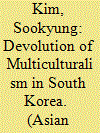

|
|
|
|
|
| Summary/Abstract |
This paper examines South Korean media coverage of migrant workers from 1990 to 2015 and analyzes how multiculturalism is intertwined in discussions of migrant workers. I find that South Korea, once an avid supporter of multiculturalism, is slowly retreating from it, like other countries, but not in the same direction.
|
|
|
|
|
|
|
|
|
|
|
|
|
|
|
|
| 7 |
ID:
099166


|
|
|
|
|
| Publication |
2010.
|
| Summary/Abstract |
Migrant workers have become a major element of the labor force in Chinese cities, making important contributions to the economy while forming a socially disadvantaged group. Existing research on the relationship between the level of nutrition and health and income in China mainly focuses on farmers living in rural areas. Based on a Mincer equation and using a survey in Beijing, this paper examines the relationship between migrant workers' nutrition and health levels and their monthly incomes. We find that the nutrition intake and the body mass index have positive effects on income while duration of illness and daily working hours have negative effects. These conclusions imply that the Chinese Government should put more emphasis on improving migrant workers' well-being, including offering educational programs on nutrition and health, and enhancing medical insurance and the old-age insurance system.
|
|
|
|
|
|
|
|
|
|
|
|
|
|
|
|
| 8 |
ID:
158062
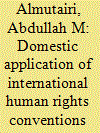

|
|
|
|
|
| Summary/Abstract |
This article examines the application of international human rights conventions in Saudi legislation where Sharia is the main source of law. Saudi laws often adopt the dualistic approach and its international human rights obligations must be in agreement with the Sharia. This paper further intends to explore the Kingdom of Saudi Arabia's (KSA) position on reservations and ratifications of international human rights conventions generally and in the context of migrant workers’ rights particularly. Since the KSA has not ratified any convention related to migrant worker protection, it is essential to examine the role of national human rights organisations in implementing and promoting human rights in the KSA and the article explores the significant efforts made by these organisations to implement and protect the rights of migrant workers in the country. It argues that the KSA has ratified a number of human rights conventions such as the International Convention on the Elimination of All Forms of Racial Discrimination; however, it has failed to comply with its provisions. It is suggested that non-discrimination provisions of some of these conventions may be used to advance migrants’ rights in the country.
|
|
|
|
|
|
|
|
|
|
|
|
|
|
|
|
| 9 |
ID:
113843
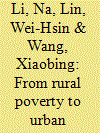

|
|
|
|
|
| Publication |
2012.
|
| Summary/Abstract |
China's impressive growth has been accompanied by huge rural-urban divide and social sacrifice of many including rural-urban migrants. Reflecting on the documentary Last Train Home (2009) by Lixin Fan, this paper identifies and examines the life of rural-urban migrants in China in terms of poverty-reduction, child-care, education and equal opportunities for a better life. By comparing the seemingly difficult and tragic life of the Zhang family against statistical facts, it shows that their suffering and struggles are common to most migrants. In essence, by creating an interactive dialogue between the film and the economic reality in China, this paper highlights the severe constraints on the Chinese peasantry and discusses the implications of limited choices and social injustice towards rural-urban migrants. It argues that the inequality in opportunities and the lack of social care for migrants has created huge social cleavage that not only reduces social welfare but may also impede further development.
|
|
|
|
|
|
|
|
|
|
|
|
|
|
|
|
| 10 |
ID:
089196
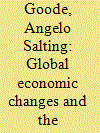

|
|
|
|
|
| Publication |
2009.
|
| Summary/Abstract |
East Asia's economic prowess strongly impacted the research agenda of scholars studying the region. Whereas analysts had once focused on military governments, relations of dependency, clientelism, and low modes of peasant movements, they now investigate industrialisation. In East Asia, the Philippines is the largest contributor of migrant labourers to the global workforce. Following recent discussions by Robert Putnam on the social aspect of investment, perhaps human capital might then be considered part of the industrialisation process? Channelling human resources towards expediting industrialisation can be a catalyst for development. This article seeks to combine a variety of theoretical literatures with insights gained from conducting fieldwork and available empirical data, presenting its main findings in two major parts. The first focuses on the relationship between human capital, migration and economic growth, and suggests that social capital, particularly human resources, can help economic growth in developing countries if channelled appropriately. The second is a case study of the Philippines as the second largest exporter of human labour in the world, with human capital as its largest export commodity. A key feature of the research identifies the significance of commodifying human capital. The author argues that maximizing human resources, as a potential and un-channelled catalyst for improved economic growth is a good investment in social capital. By transforming human resources into a trade commodity, this economic transaction between labour-sending (parent) and labour-receiving (host) countries becomes a rational process that takes on emotional qualities, and must be considered where the trade of human labour is concerned.
|
|
|
|
|
|
|
|
|
|
|
|
|
|
|
|
| 11 |
ID:
085992
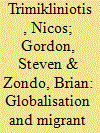

|
|
|
|
|
| Publication |
2008.
|
| Summary/Abstract |
This paper focuses on the processes of localised and globalised racialisation of migrant workers in South Africa, which have allowed it to treat the question of free movement, migration and integration more or less in the image of Europe. The 'rainbow nation' seems to be racialising and excluding the 'xenos' based on the apartheid legacy's treatment of migrant black labour. Moreover, the myth of the 'weak state' serves to cover up the power of capital, which is benefiting from the drive to informalisation and the irregular/undeclared work of undocumented workers. Trade unions have failed to organise migrant workers, initially reacting defensively, but now increasingly recognising that migrant workers must be incorporated in the movement and their rights defended for the benefit of all workers. If trade unions look at the European and US experience they will find similar dilemmas but also strategies for incorporation in the unions. Finally the paper looks at future challenges beyond racialisation and xenophobia.
|
|
|
|
|
|
|
|
|
|
|
|
|
|
|
|
| 12 |
ID:
085985
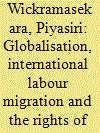

|
|
|
|
|
| Publication |
2008.
|
| Summary/Abstract |
The aim of the paper is to highlight the gaps between policy and practice in the current discourse on international migration and its links with development. It contends that a major cause of the limited development impact of migration is the 'closed door policy' of major destination countries on the admission of low-skilled migrant workers from developing countries. The paper addresses the weak foundations and major consequences of this policy: the denial of labour demand, channelling a large part of flows to irregular migration, consequent exploitation and violation of rights of migrant workers, and accelerated brain drain from developing countries. While there is increasing emphasis on temporary migration policies and programmes for low skilled labour, achievements on the ground have been quite limited. The movement towards a global migration regime which can address current pressing issues has also not progressed beyond broad consultative forums. There is an imperative need for fresh approaches and bold initiatives to promote international labour mobility for the welfare of the global community.
|
|
|
|
|
|
|
|
|
|
|
|
|
|
|
|
| 13 |
ID:
186942


|
|
|
|
|
| Summary/Abstract |
The household registration (hukou) system has been widely recognized as a key contributory factor to social inequality and tensions in China yet it remains intact despite a series of institutional reforms. What explains the resilience of the system? In this study, we address this puzzle by drawing on policy documents, statistical data and interviews. We argue that the hukou system remains because it is used to protect the beneficiaries of welfare provision and to ensure pivotal groups continue to offer political support. We find that owing to the reforms, a formidable barrier has been erected between the guarded cities and other regions to protect healthcare and education resources from inbound migrant workers. Consequently, the institutional reforms of the hukou system serve as a political contrivance for the survival of the Chinese party-state regime. The findings contribute to emerging literature on China's political control by elaborating political elites’ subtle tactics through various institutions at central and local levels. We expect the new “Great Wall” established under Xi's administration to be an even stronger barrier than before for migrants during the current pandemic and in the future.
|
|
|
|
|
|
|
|
|
|
|
|
|
|
|
|
| 14 |
ID:
138107
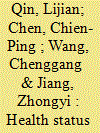

|
|
|
|
|
| Summary/Abstract |
The migration of rural laborers into cities for employment has been one of the main driving forces of China's economic growth over the past three decades. Based on a dataset collected by the Ministry of Agriculture of China from 2003 to 2007, this paper examines the impact of health on the earnings of migrant workers engaging in physically-intensive work requiring good health. Our findings indicate that a poor health status not only weakens the incentive of rural laborers to participate in the migrant labor force but also significantly reduces their earnings. A migrant worker in poor health only earns 67 percent of what a healthy worker makes. Among all the human capital characteristics and family economic factors, health status is the most influential on earnings for less educated workers. Labor productivity has a greater impact on earnings than the annual number of days that a person works. Ongoing health-care reforms aimed at the improvement of the health-care services available to rural laborers are urged to help reduce poverty in rural China.
|
|
|
|
|
|
|
|
|
|
|
|
|
|
|
|
| 15 |
ID:
193007
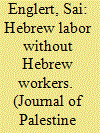

|
|
|
|
|
| Summary/Abstract |
The Histadrut was founded in 1920 to organize the so-called Zionist conquest of labor, which aimed to exclude Palestinian workers from the economy. While this ideology was central to the Yishuv, labor shortages and settler-colonial expansion following the establishment of the State of Israel in 1948 led to the integration of Palestinian workers in the workforce. Focusing on the construction industry, this article explores the ways in which the Histadrut’s contemporary membership structure, collective agreements, and relationship to the Israeli state serve to further institutionalize a highly racialized and segregated sector. Palestinian and migrant construction workers toil in dangerous circumstances for low pay, without union protection, and under the supervision of unionized Jewish managers and engineers.
|
|
|
|
|
|
|
|
|
|
|
|
|
|
|
|
| 16 |
ID:
147646


|
|
|
|
|
| Summary/Abstract |
Most migrant workers in mainland China are officially covered by the New Rural Cooperative Medical System (NRCMS), a rural health insurance system that operates in their home communities. The NRCMS and the system of household registration (户口, hukou) are tightly linked and systemically interdependent institutions. Migrant workers have difficulties benefitting from this social protection because it remains spatially separated from them. Only a minority have access to urban health insurance systems. This paper sheds light on the institutional origins of the coverage problem of migrant workers and examines crucial policy initiatives that attempt to solve it. In the context of the ongoing hukou reforms, these policies aim to partially dissolve the systemic interdependence of hukou and health insurance. While the policies provide feasible, yet conflict-prone, solutions in short-distance and concentrated bilateral migration systems, covering migrants who cross provincial boundaries remains a challenge.
|
|
|
|
|
|
|
|
|
|
|
|
|
|
|
|
| 17 |
ID:
091896


|
|
|
|
|
| Publication |
2009.
|
| Summary/Abstract |
Economic hardship and porous borders have contributed to the rise in human trafficking in Central Asia, but there is no significant cross-border cooperation to crack down on the trade. Erica Marat examines why some governments are keener to address the issue that others.
|
|
|
|
|
|
|
|
|
|
|
|
|
|
|
|
| 18 |
ID:
177773
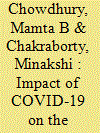

|
|
|
|
|
| Summary/Abstract |
This study examines the impact of COVID-19 on the migrant workers and remittances flow to Bangladesh, the fastest growing South Asian country. Migrant workers have been playing an important role in propelling the economic activities of the country for a vast majority of the low-income population. Bangladesh is one of the major remittance recipient countries and earned US$21.8 billion in 2020. Over half a million workers from Bangladesh are employed in foreign countries annually, which eases the pressure on the domestic labour market considerably. However, the inflow of these enormous remittances has been encountered by various challenges including the ongoing COVID-19 pandemic, which has brought numerous adverse socio-economic impacts on the migrant workers. Policy recommendations suggest designing and implementing well-coordinated public–private migrant workers’ inclusive policies and creating a supportive environment for the returnee migrant workers to overcome this crisis. Initiating dialogues and negotiation with the employing countries to protect the jobs and workers’ rights can restore the employment and remittances during and after the pandemic, facilitate the expansion of the labour market across borders, and harness the valuable remittances for the overall welfare of the country.
|
|
|
|
|
|
|
|
|
|
|
|
|
|
|
|
| 19 |
ID:
182941
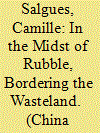

|
|
|
|
|
| Summary/Abstract |
Drawing from two ethnographic studies of children, one in a former industrial neighbourhood in the process of demolition in Shanghai, and the other in a rural town in Guangdong, this article explores the relationships children form with the landscape of ruins as they wander about with the aim of identifying the opportunities these offer in terms of games, freedom, and sharing, etc. The article analyses two different dynamics in the types of ruins and the experiences associated with them: concentration and dispersion. The structural geography and qualitative demography that emerge from this are barely mentioned in Chinese public debate, in its categories (children of “migrant workers” or “left-behind” children), its problems, and its very negative representations, but whilst they underline the unequal divisions in society, they also reveal a richness of experience that is far from being necessarily unhappy.
|
|
|
|
|
|
|
|
|
|
|
|
|
|
|
|
| 20 |
ID:
186821


|
|
|
|
|
| Summary/Abstract |
This article explores the lived experiences of some Indian migrant workers (MW) during the first COVID-19 pandemic nationwide lockdown, investigating their plights from a social identity perspective. It analyses crises associated with the COVID-19 pandemic, and with hunger and starvation. Drawing on a qualitative study conducted with twelve participants in the city of Pune in the Western Indian state of Maharashtra, the findings suggest that the participants’ plights have been exacerbated by the COVID-19 pandemic. The findings indicate the need for policy responses to focus on addressing conditions of work, terms of employment and access to necessities for Indian MW, including ensuring conditions for a prompt job-ready recovery and mental health care after the COVID-19 pandemic.
|
|
|
|
|
|
|
|
|
|
|
|
|
|
|
|
|
|
|
|
|